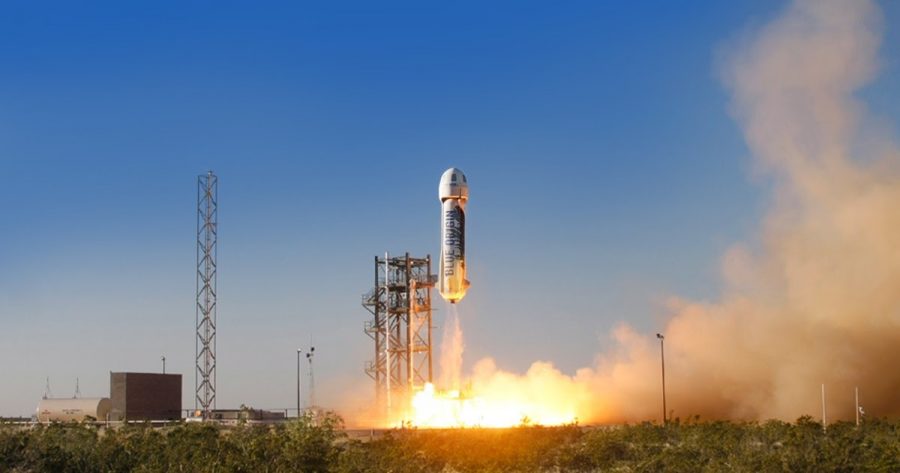Letter to the Editors: the Future of the Space Industry Belongs to Private Companies
Billionaire Jeff Bezos founded a private rocket company, called Blue Origin, in 2000.
January 23, 2021
Outer space.
The word calls to mind dreams of aliens and starships and colorful galaxies.
Who among us has not looked up at the depths of the night sky and imagined what untouched wonders lie there? Outer space transcends barriers, rouses the mind, and ignites the curiosity of the human spirit.
This fascination does not exclude the federal government. Space exploration has been one of the most compelling responsibilities of the U.S. federal government for over 60 years. Since its founding in 1958, NASA has pushed the boundaries of what humankind can do, giving it a legendary status in the mind of the average American.
Until recently, NASA was the only center of space research and experimentation. However, with the growing success of private companies, the landscape of the space industry is changing like never before. Is it time for NASA to take a step back and allow the private sector to take control?
Despite NASA’s important contributions, privatized space exploration holds immense economic opportunities that the U.S. government cannot ignore. Expanding the private sector and applying a model of advanced capitalism to it could save money, lead to more jobs, and drive faster advancements.
Private space exploration is already proving to be far more cost effective. According to an opinion piece from Penn State University, SpaceX’s Dragon Capsule is 320 times less expensive than a comparable vessel from NASA, the Orion Capsule. And, with revolutionary technology, SpaceX reuses their rockets, saving millions in the process.
Additionally, NASA has been faulted for what some deem “unnecessary spending,” and private companies could help avoid this. For example, NASA recently sent a $23 million toilet to the International Space Center, and in 2019, Bloomberg News criticized NASA for an “unnecessary” payment of $287.2 million to Boeing Co. Talk about a waste of tax dollars–– the government should have used these wasted millions to address more pressing issues.
Alternatively, a private company has full responsibility over its spending, thus would have no motivation to waste any money. Tax dollars come from the public, so the federal government should use this money in the public’s best interest.
The privatization of the space industry would also allow for the creation of new jobs, which would boost the economy and provide new opportunities for the nation’s workforce. As an article from SpaceNews asserts, private companies are suggesting “everything from space hotels, human transportation systems, man-tended laboratories, in-space manufacturing, energy harvesting, asteroid mining, fueling depots, Earth imagery, [and] small satellite constellation-based internet services.” In the future, as space travel becomes more commonplace, the service industry would be able to create hotels and restaurants in space. These ventures could expand the economy in ways NASA or any other government-funded organization would never have the time or money for.
Despite this tantalizing prospect, many worry that restrictions are needed in such a high stakes industry. Take SpaceX, for example: many of its rocket launches have ended in fiery explosions, calling into question the company’s validity. One might ask, is Musk rushing into something he is not prepared for?
Private companies do not hold the same authority as the federal government, and for good reason. Perhaps we should leave something as high-stakes as space travel in the trusted hands of NASA.
But other industries have already proved how business regulations can solve this. If the same kinds of regulations are put in place for private space companies, we can mitigate any dangers.
Still, others worry that since private companies are motivated by economic profit alone, they might not experiment with new technology in the same way NASA can. Knowledge would become a commodity, something to be bought and sold instead of used for the benefit of the entire country.
However, the right economic model could help avoid such technological standstill. More business partnerships would propel advancements, and healthy competition from a modern capitalist system would lead to faster technological advancements. It would give all the scientific benefits of federal research, but with the added bonus of helping the economy.
America needs NASA. But for the sake of economic benefit, the government should support the privatization of the space industry.
This does not mean the end of NASA. Instead, federal and private space ventures can work together, to propel America to the forefront of the global stage in space. Private space companies could take pressure off of the federal government, and allow tax dollars to be spent elsewhere. They would provide key jobs and boost the economy. And the generations to come will look up at the stars and think of space not as a realm of the government-employed alone, but as a place where any American could live and work.

































